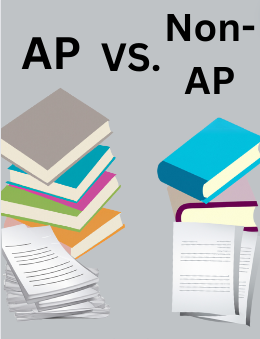
Advanced Placement (AP) classes are well-known for looking better on college applications and providing GPA boosts, but are they truly harder than regular classes?
AP European History teacher Kelli Peters describes her students’ average amount of work and average test and quiz scores in her class.
“[My students] have two weeks to complete two chapters of reading, which is about 60 pages,” Peters said. “I don’t expect them to follow that, but I do want them to.”
“I always curve grades because they’re modeled after the AP test, which is very difficult,” Peters said. “The [average] raw score is about 60 percent, which turns into a 77 or 80 percent [after the curve].”
Meanwhile, World History Teacher Brad Osborne noticed his student’s lack of motivation.
“If [my students] are productive in class, they have few [homework assignments],” Osborne said. “The [only] homework I give students is work they don’t get done in class.”
Osborne’s students have the opportunity to do well given they use time wisely in the class, contrary to what he currently observes.
“The average grade in my higher classes is around a C+ to B-. On my lower classes, it’s a lower C average,” Osborne said. “If you’re productive in my class, you’ll do good. Unfortunately, most [students] are not.”
Clifford Traylor, an AP Biology and regular Biology teacher, compares his AP Biology to his non-AP Biology class.
“My AP Biology class gets homework three times a week. My regular Biology gets homework two times a week,” Traylor said. “Both classes average around a B average.”
While AP classes are more difficult, many students who take these classes are well-prepared for the workload and are largely successful.







